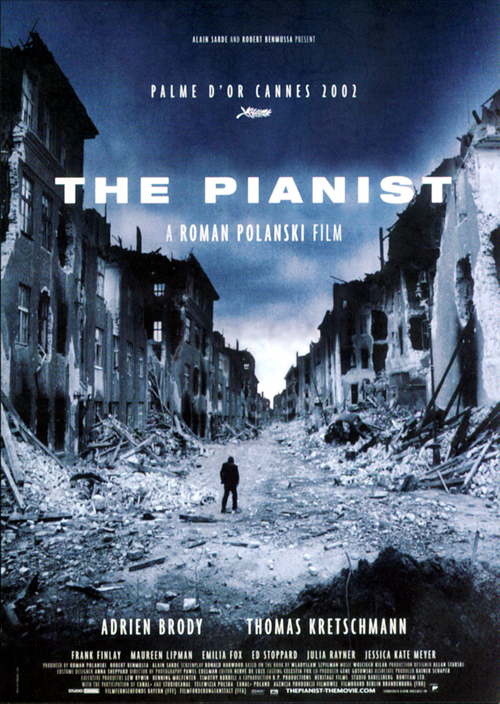 “Spielmann? That is a good name, for a pianist.”
“Spielmann? That is a good name, for a pianist.”Roman Polanski has proved that he is a great director with films like Chinatown and Rosemary's Baby but this is his crowning achievement. The Pianist follows up and coming piano player Wlad Spielzman from his days as a local hero to a prisoner of war to his time in the ghettos, surviving only by the kindness of strangers. I think many people have touched on this before but what makes this film so amazing and well crafted is because Spielzman is a man that we can all relate to. He is not a hero, he is not a rebel and he is not a kamikaze type that wants and lusts after revenge. He is a simple man that is doing everything in his power to stay alive. He is a desperate man and fears for his life and wants to stay as low as he can. Only from the succor he receives from others does he manage to live and breathe and eat and hide. And this is how I related to him. If put in his position, how would I react? Exactly the way he did. This is a man that had everything taken from him. His livelihood, his family, his freedom and almost his life. There is no time for heroics here.
Does the pianist raise any sympathy from the audience? Not immediately, in my view. The pianist is more than often a drifting character, almost a witness of other people's and his own horrors. He seems to float and drift along the film like a lost feather, with people quickly appearing and disappearing from his life, some helping generously, others taking advantage of his quiet despair, always maintaining an almost blank, dispassionate demeanour. One may even wonder why we should care in the least about this character. But we do care. That is, I believe, the secret to this film's poetry.
In one of the strongest scenes, towards the end, a German officer forces the pianist to play for his life, in an episode that suddenly brings a much lighter, beautifully poetic shade to the film (this German officer will be probably compared to Schindler, although his philanthropy does not quite share the same basis).
This is also a wonderful tribute to Polish artists, through Chopin's music, with the concert at the very end of the film and the opening performance by the pianist at the local radio station (with the sound of bomb explosions in the background) forming an harmonious link between the beginning and end of the film (following Polanski's usual story-frame).
This is one of the best films I have ever seen and what it did to me I cannot describe in words. But in a nutshell, it moved me, made me cry, made me feel like I was in the Polish ghetto in 1940, and ultimately made me kiss the sidewalks as I walked out of the theater and thanked God that I live in the free society that I do. 10/10
0 Comments:
Mensagem mais recente Mensagem antiga Página inicial
Subscribe to:
Enviar feedback (Atom)


